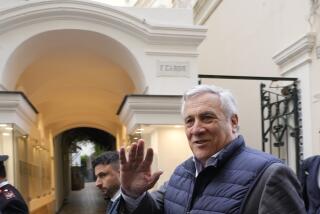Japan Unfazed by West’s Call to Stimulate Its Economy
- Share via
LONDON — The United States and its major Western allies are becoming more and more frustrated over Japan’s continuing refusal to jump-start its stalled economy, but they may as well just get used to it, analysts say.
The Western governments contend that a rejuvenated Japanese economy would ease the Asian financial crisis, because Japan could then buy more exports from countries in the region, helping them to recover.
But analysts believe that no matter how much pressure the United States and other Western governments exert, Tokyo is likely to act only when stimulating its own economy looks both necessary and politically feasible.
And that could be months--even years--away.
Western finance ministers turned up the heat again over the weekend at a meeting here of the Group of Seven--top economic officials of Britain, Germany, France, Italy, the United States, Canada and Japan--but the Japanese barely seemed to notice.
And while the G-7 can rail all it wants about Tokyo’s refusal to take stronger steps to spur its economy, it has no power--beyond the use of moral suasion--to force any country to heed its pleas.
Gordon Adams, deputy director of the London-based International Institute for Strategic Studies, predicts it will take a major crisis in Japan itself--a serious recession or a financial crash--before Tokyo will act.
*
Despite Japan’s sluggish economic performance over the last seven years, “they haven’t had that crisis yet,” Adams said. The economic doldrums have slowed business somewhat but have not yet affected ordinary citizens.
“What the Japanese have been experiencing so far has been just a very slow bleeder,” Adams said.
To be sure, the United States has some leverage. If the U.S. trade deficit with Japan grows very much larger, as many believe it will, Congress could seek to impose new restrictions on Japanese imports.
But experience shows that that sort of action usually hurts the United States more than it damages Japan, and Washington needs Tokyo’s cooperation on a spate of important security issues, such as basing U.S. troops in Okinawa.
The administration also wants Japan’s help in picking up South Korea’s share of financing the two nuclear reactors that Washington, Tokyo and Seoul have promised North Korea, at least until the South can get back on its feet financially.
Officials fear that if the reactor project is derailed, North Korea will resume its manufacture of weapons-grade plutonium, heightening the threat of nuclear proliferation. An embattled Japan is unlikely to go along.
U.S. Treasury Secretary Robert E. Rubin points out that during the 1970s and ‘80s, the United States behaved much like Japan is now. Then, the allies were regularly demanding that America trim its outsize budget deficit.
Every year, the finance ministers’ communiques got testier and testier. But Washington all but ignored the appeals. Indeed, the Reagan administration even tried to convince the allies that the deficit was a boon to the world economy.
What finally led America to act was that the deficit eventually became a political liability, and Congress concocted a scheme for dealing with it--the Gramm-Rudman-Hollings bill, which made deficit-cutting a bipartisan goal.
South Korea provides another example. The allies have been pressuring it for years to overhaul its Third World financial structure by strengthening its banking regulations and eliminating cronyism in lending to conglomerates.
But Seoul consistently refused to budge.
Then came the Asian financial crisis--which threatened to undo 30 years of Korea’s development--and a new president, Kim Dae Jung, who coincidentally favored precisely the reform measures the allies had prescribed.
After a few weeks of dithering, Seoul abruptly unveiled a set of sweeping reforms that seem likely to strengthen the country’s financial structure and to overturn a large chunk of its traditional lending system.
By contrast, Japan has had no domestic crisis big enough to generate demand for bold action, and its government is burdened with political problems that make serious reforms unlikely. Other factors include:
* Analysts say Prime Minister Ryutaro Hashimoto has proved a weak leader by any standard, and he is on record opposing any effort to jump-start the economy. To reverse his stand now would be almost impossible.
* The ruling Liberal Democratic Party, which once might have pushed through a potent economic stimulus package, is fragmented and ineffectual, and Hashimoto controls only a small faction inside the party.
* There still is no pressure from Japanese voters for the government to stimulate the economy, either by cutting taxes and passing new spending programs or deregulating the financial system, as it has pledged to do.
As a result, analysts say, while the G-7’s pressure may be useful in holding Japan’s feet to the fire on the stimulus issue, it is unlikely to spur much action any time soon.
Said Alan Stoga, a New York-based international economic analyst: “The hole in the world economy that could most visibly help ease the Asian economic crisis has not as yet been filled.”
More to Read
Sign up for Essential California
The most important California stories and recommendations in your inbox every morning.
You may occasionally receive promotional content from the Los Angeles Times.













